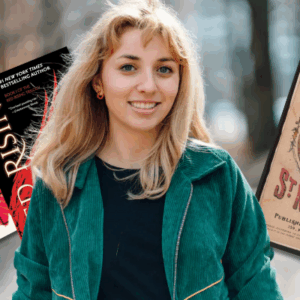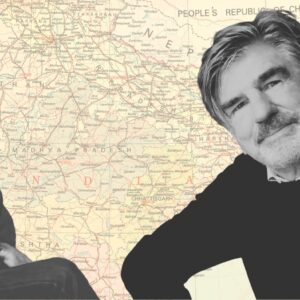
Brit Bennett on Place, Isolation, and What it Means to Be Good
Gabrielle Bellot in conversation with the author of The Mothers
In a powerful blog post for The Paris Review on American dolls, race, and violence, Brit Bennett relates the story of a 17-year-old boy from Virginia whose mother allowed him to opt out of reading Toni Morrison’s Beloved for a class. The novel, his mother feared, was “too intense” for her child and gave him nightmares. “Why,” Bennett asks, “should her son be allowed to opt out of a horrifying history just because it unsettles him?”
Bennett’s brilliant new novel, The Mothers, deals with similar themes: how difficult experiences—most notably, an abortion that one of the central characters, the teenage Nadia Turner, decides to undergo—follow her characters, seeping into their nightmares, and then leaking out of them into the real world. The events in her book are real and resonant; none of her characters can opt out of dealing with them.
Ghosts haunt much of the fiction of diasporic blackness. Phantoms, like history, can’t let go of the earth; they live on after death. The narrator of Ralph Ellison’s Invisible Man thinks of himself as a kind of invisible phantom due to his blackness, terrifying when seen, yet unseen most of the time. Nalo Hopkinson’s fiction brims with phantoms from Caribbean mythology. Angela Flournoy’s The Turner House begins with a vision of a ghost—a “haint”—that wrestles with the characters; in The Mothers, Nadia Turner feels followed by the ghost of the child she has not had, wrestling, like a less devout Jacob, with God. Sometimes, the ghosts that scare us the most are the ones that aren’t supernatural, the ones born in the spaces between our own decisions.
Here is a poignant, yet lovely novel about so many things: loss and gain, regret and hope, solace and separation, motherhood and fatherhood. The Mothers is one of those novels you truly don’t want to put down. Bennett’s book revels in its layered characters and setting, a book where place and personhood become mixed, and where who people think you are is sometimes more important than who you actually may be. The church of this book, as many churches are, is multifaceted: it provides solace, but it can also hurt, something that Baldwin and Bennett alike describe, in their own ways, so well.
I had the privilege of speaking with Bennett about The Mothers, gender, exile, religion, and much more.
Gabrielle Bellot: So, one of the things that I was really interested by is the fact that this book begins with an abortion—how removing the possibility of a life takes on so much life in this novel. The unborn child follows not only Nadia, but also [its would-be father] Luke and even [Nadia’s friend] Aubrey, through the entire novel. By beginning with this event that haunts each of its characters, The Mothers becomes a fascinating text in which we break down stereotypes not just about women, in particular black women, who have abortions, but also about the stereotypical image of the young American black father. So, why begin the novel like this? And was there something you were trying to tell us about what it might mean to have a child, or, perhaps, not to have one?
Brit Bennett: Yeah. So, I knew that I wanted to open the novel with an abortion; I didn’t want to hedge on it because I knew that it was a decision the character would make, and I didn’t really see any reason to be coy about that. It did present challenges from a craft point of view, because you’re basically beginning with something that’s ended, so there’s not really an obvious next step. But I knew that it was the place that I wanted to begin. And as far as how this idea of the characters being haunted by this choice they’ve made came to be—well, I was really interested in Luke because, originally, he reacted to this abortion in the way that we would expect a young man to stereotypically react, in that he’s just sort of relieved and wipes his hands clean of it and doesn’t look back. But, as I kept working on the book, that just seemed boring to me. I became more interested in how a man might experience a type of regret, in that he feels he didn’t get any opportunity to really make a decision. To me, he became a much more interesting character when I started thinking of the ways in which he distilled this regret—and, also, the ways in which Nadia, in turn, feels guilty for making the decision that was best for her.
GB: That leads into me thinking about masculinity or femininity in the text more broadly, as I can’t help feeling that so much of this novel is about conceptions of gender, particularly when you come from, or live in, a small place, as the characters do. I grew up on a small island in the Caribbean, and we had all these entrenched ideas about what women or men were supposed to be, and the church was very much a site for determining gender. As a trans woman, I think a lot about how societies so often define womanhood in terms of having children, as I cannot have a child myself. While womanhood is not limited, of course, to whether or not you can give birth to a child, this is one of the gendered expectations so common not only in the society I came from, but in the Oceanside’s expectations in your novel. Could you talk a bit more about the role gender plays in The Mothers?
BB: I think the book is occupied with ideas of social expectations, and these often are gendered expectations, like you’re saying. So, in the case of Luke, he’s this football player whose career is ended after a brutal injury, and this really changes his conception of himself as a man. I think he fashions himself as a tough guy, but then he’s injured, and now he has a limp; his body doesn’t work in the way that he thinks it should, and all of these are things he struggles with. The abortion, too, and his regret, also challenge his conception of himself as a man. There is this idea for men that you should just feel relieved that you were able to avoid the responsibility of taking care of a child, like you kind of got lucky, but that’s not the way he feels. And I’ve always been interested in relationships between and among women, like the way that Nadia and Aubrey both have expectations put upon them. Aubrey is supposed to be this good church girl, yet she struggles with secrets from her past, while Nadia has gained this reputation of being a sort of bad girl. I wanted to break down some of these stereotypes. I wanted to show that people are more complex than the roles prescribed to us by our genders.
GB: Yes, that’s something I really love about this book—the nuances that we find within all of the characters. And that leads me into a larger question about character, which concerns how the setting affects the characters. In so many of the best novels that feature a prominent setting, the setting either tells us something about the characters, or the setting becomes a character itself in some sense. There’s often a political shadow over such settings, particularly when it comes to a setting in which characters are young and black in America. So, I would love if you could tell me more about how place plays a role in this novel, as well as more about what influenced you to craft this particular setting.
BB: Yes. I wrote about the place that I grew up in, which was this military beach town. I had lived there since I was five. When I left to go to college in the Bay Area and, eventually, to the Midwest, I began to see my hometown with a new perspective; I realized things about my upbringing and about the place I had grown up in were very distinct. Over time I just began to feel that that was the right place to set the book, even beyond the fact that it was where I grew up and what I knew. It was this sort of idea of a military town where you have a lot of people coming and going, this place in which you have lots of makeshift communities that have emerged in a transitional space. You know, this is a setting that is very physically beautiful—the seaside, the sun, the trees—but also very dangerous. There’s always a threat of danger, like wildfires that linger, particularly in southern California, and these dangers took on some thematic resonance. As more people read the book, I realized that it seemed unusual to readers to have a book with black characters living in a beach town, rather than an urban or rural setting—this was something that seemed different to them. I was glad to be able to do something different, though I didn’t ultimately set out to do that in the beginning.
GB: I think one of the biggest settings here has to be the church—not the physical site of the church, per se, but just the overwhelming concept of Upper Room. And, in tandem with this, we have a wonderful technique that begins most of the chapters, where women from the Upper Room speak in a kind of chorus. Could you tell us more about these women and this choral technique?
BB: Ah, yes—this was actually something that emerged pretty late, something I had been hearing as I was writing and tried to locate within certain characters. The church mothers are this sort of moral authority, but they are also misguided; they aren’t an objective moral authority, and I think there are moments where the readers can very clearly see around the church mothers, can see what they are missing and misinterpreting. To me, it was this gap between the mothers’ ideas and what these younger people are experiencing that became very interesting—the ways in which we think we know each other, but we really have no idea what’s going on in the lives of other people. I think I just liked the concept of these women, who didn’t have much actual institutional power within the church, but are very powerful because they are constructing narratives. In a way, the greatest power that you can have is to construct a story about somebody else.
GB: So much of the book seems to be about the power of rumor or gossip to construct a person. And a great deal of what these church mothers speak of is what it means to be “good.” I was intrigued by this, partly because, like many other people, the first piece of yours I came across was your essay on Jezebel about what it means to be a “good white person,” and especially what it means to be good in a sort of false sense—people who think they are being good or helpful, but don’t get what goodness actually is. I’m thinking of Aubrey, this person thought of as a good church girl, and how her goodness begins to feel alienating to Nadia at some point. Yet Nadia seems to also want to be more like Aubrey, and Aubrey seems as though she envies Nadia at times. Could you say more about why goodness is so important to the characters? And what does it mean to be good, really, at the end of the day, in this text?
BB: Oh, that’s a good question! [Laughs] I don’t know. I think one of the reason that goodness matters here is because the book takes place in a spiritual community, and Nadia feels like an outsider. She doesn’t care about religion in the way that her father does, and she feels like she’s on the fringes of this community. She looks at someone like Aubrey, who seems like she’s always belonged. The idea of goodness links Nadia and Aubrey together. There’s a way that Nadia looks to Aubrey to absolve her of her own sins, this sense of her drawing near to Aubrey out of the idea that Aubrey’s inherent goodness will somehow cleanse Nadia of her regrets. But Aubrey, too, like you say, envies Nadia, a character who goes where she wants and takes chances in a way that makes Aubrey feel unworthy in her presence. Goodness is something that the characters want, but also something that can make them feel trapped or oppressed. I’ve always been fascinated by that. All of these characters, from their own perspectives, would probably think they are good, to some extent. The reader might disagree, but I wanted to explore the different ways in which characters can justify or rationalize the different things that they’ve done, the way that they can justify the people they’ve become or feel disappointed by who they’ve become.
GB: Definitely. There’s this wonderful sense in your novel of goodness as a nuanced thing, the way that what is good for me may not be good for you, or vice versa. This makes me think, in an indirect way, of something else that’s really present in your novel, but also very understated: the concept of negativity. You use this wonderful negative term in the book, “unpregnant,” and there are a few other notable “un-” words there, like “unloved.” Because of the overwhelming presence of the church in the book, I began thinking immediately of negative theology, the idea of presence through absence, or absence through presence. There’s so much in this novel about absence—but absence is too simple, because presence is also part of it: the baby who haunts Nadia, the concept of being a mother and also of not being one. What does this sort of negative space mean to you in terms of your novel? Was this something you were thinking of as you started writing this book, or was it something that came to you later?
BB: There’s a way in which all of the characters in the book are haunted by a form of loss; in a way, those losses structures the book. Luke is haunted by a football career; Aubrey has lost her mother in a different way. And you’re right in the sense that, a lot of times, what’s not there often becomes more present than what actually exists. I don’t know—to me, that was just something that felt human, this idea that we can feel fixated on what we’ve lost to the point that we don’t pay attention to what we’ve actually maintained. It wasn’t something that I originally set out to do, but it was something that emerged later—the way that all these losses, the regrets, all of that kind of space, began to intersect, which was where a lot of the tension of the novel was generated.
GB: Yeah. And we have characters here who are defined by their outsider status, too—not just what they’ve lost, but by things they feel like they’ve never had. In many ways, loss and distance seem like things that connect the characters; these negatives that have a kind of solidity, like you were just talking about. The town itself has an interesting isolating quality, even though it’s centered around a community that the characters think they’re supposed to be a part of. So, I think the question that interests me the most would be: do you consider this a novel of exile?
BB: You know, I never thought of it that way, but those are true things about this book. I grew up in the church. There is this idea that, as a Christian, you are meant to live apart from the world, and, as a kid growing up hearing that, it was so weird and scary and interesting. Now, obviously, as an adult, I understand that this was a metaphor, but I was always interested in that idea of leaving the world, of existing apart from everyone else—and whether or not this was actually a good thing, as it’s often framed in a lot of Christian theology. Nadia is certainly a character who leaves her community, though she is continually tugged back in different ways, sometimes against her will. And I’m thinking, too, of the church mothers, who exist almost solely within the church. The world is too hurtful for them, so they seek solace in the church, but there is a way, too, in which they are apart from everybody else. That wasn’t a theme I consciously tried to create when I was writing the book, but I’ve always been curious about this idea of living apart from the world, and wary of it, as well.
GB: It’s interesting you connect it to this idea of finding solace in the church. This concept of seeking solace in the church and finding it, or more often not finding it, really does remind me of Baldwin, particularly in Go Tell It on the Mountain. Okay, so, before I let you go, my final question: what are you working on next? Sorry! [Laughs]
BB: [Laughs] I just started a new novel that’s set in the South about a pair of sisters that gets separated. I’m still early into a first draft, nothing coherent yet, but I’m hoping that it will be a little more expansive than The Mothers; I think The Mothers is pretty tight. So, I think this next novel will be a little bit longer than The Mothers and may have more characters. But this is just me saying this now. We’ll see what happens!
Gabrielle Bellot
Gabrielle Bellot is a staff writer for Literary Hub. Her work has appeared in The New York Times, The Atlantic, The New York Review of Books, The New Yorker, The Paris Review Daily, The Cut, Tin House, The Guardian, Guernica, The Normal School, The Poetry Foundation, Lambda Literary, and many other places. She is working on her first collection of essays and a novel.



















